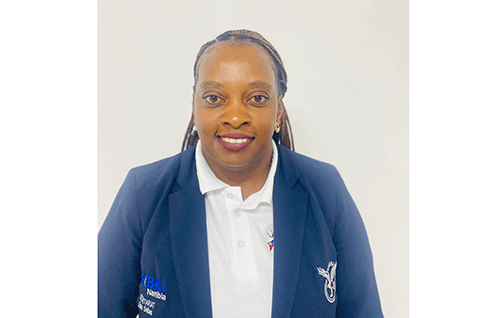Juanitha Witbeen was elected as the new president of Netball Namibia at the successful annual general meeting held over the weekend. She will be in office until 2027.
Witbeen secured nine votes to seal the presidency, defeating rival Seu Gowases who managed to garner five votes.
She takes over from Rebekka Goagoses, who had been at the helm since 2022. Speaking after her election, Witbeen expressed pride and gratitude at being entrusted with leading the association.
“I’m incredibly honoured and humbled to be entrusted with this responsibility. Personally, it’s a proud moment, not just for me, but also for everyone who has walked this journey with me. I’ve always believed in the potential of Namibian netball and the power of sport to uplift communities, especially young women.
“Professionally, this role presents a tremendous opportunity to contribute meaningfully to the development of the sport and leave a legacy that inspires growth, unity, and excellence across all levels of netball in Namibia,” she said.
Outlining her immediate priorities, Witbeen said her focus will be on strengthening governance structures, rebuilding trust, and stabilising administration across all regions. Additionally, she aims to enhance grassroots development programmes while working towards Namibia’s qualification for the 2027 Netball World Cup.
“In the short term, our focus is on strengthening structures, rebuilding trust, ensuring transparency, and stabilising administration across all regions. We want to enhance visibility and participation by rolling out grassroots development programmes and increasing engagement through schools, community leagues, and regional tournaments,” she added.
On her long-term vision, Witbeen said she envisions a well-governed, inclusive, and professional organisation, with a thriving national league, a strong talent pipeline, and competitive national teams that can hold their own at continental and global level.
“By 2027, we want to qualify for the Netball World Cup. My vision is for Netball Namibia to become a continental force and for netball to be recognised not just as a sport, but as a national pride-builder and a driver of youth development,” she said.
Witbeen acknowledged that, like many sport codes in the country, netball faces challenges — chief among them being limited resources, inadequate infrastructure, and inconsistent governance. She, however, expressed confidence that these issues can be addressed through strategic partnerships and effective leadership.
“One of the biggest challenges is limited resources, both financial and infrastructural.
Many regions lack proper facilities, and without investment in grassroots systems, we risk stalling talent development. Another challenge is the need for more consistent governance and communication between regional and national structures,” she noted.
“To address these, we’re prioritising strategic partnerships with corporate sponsors, government, local authorities, and international bodies to increase funding and support.
We’ll also introduce better monitoring and evaluation systems to ensure accountability and performance at all levels. More importantly, we will ensure that all voices in netball — from players and coaches to volunteers are heard and valued,” she said.
Meanwhile, the chief administrator of the Namibia Sports Commission, Freddy Mwiya, welcomed the outcome of the AGM, praising the transparency of the process.
“As the regulator, we are indeed happy that all 14 regions attended the governance training and the special AGM. It was a resounding success, with 13 regions complying, except for Kunene.
The elections were free and fair as delegates exercised their constitutional provisions, elected the new president, and confirmed other board members.
Various resolutions were adopted, and the NSC guided the process well,” Mwiya said.
-mkambukwe@nepc.com.na



